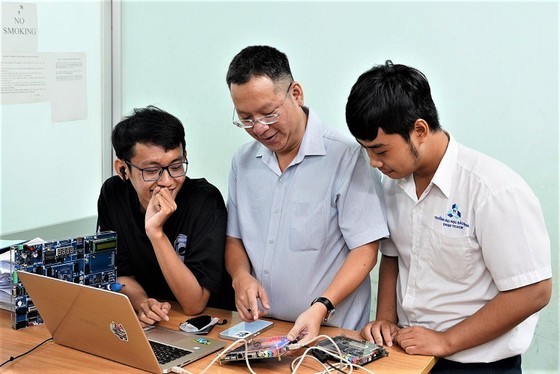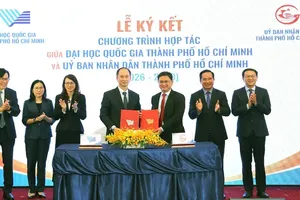 |
Students and lecturers during practical class at the laboratory of the Ho Chi Minh City University of Technology's Faculty of Electrical and Electronics Engineering. |
To supply human resources for the IC and semiconductor technology industry, many Vietnamese universities have begun enrolling and training students in integrated circuit design and IC Technology majors.
However, many schools believe that there should be a national strategy with overriding investment priority in key schools in training the workforce for IC and semiconductor technology and cooperating with businesses.
According to Vo Xuan Hoai, Deputy Director of the Vietnam National Innovation Center under the Ministry of Planning and Investment, the Government has assigned the Ministry of Information and Communications to develop a strategy for developing human resources in the field of IC design, but the Ministry has still not yet worked out the vital strategy.
Among more than 300 universities and colleges across the country, only a few schools currently have training programs or others converted occupational groups related to IC design into the major. However, schools lack laboratories in their training programs and there has been no connection with businesses in the field.
Presently, only Viettel High Tech and FPT Semiconductor have begun to participate in the designs and production of a number of chips for telecommunications and medical electronics, but the two have seen a shortage of human resources.
Facing this reality, lecturer Vo Xuan Hoai believed that it is necessary to have a long-term strategy along with policies and solutions to develop human resources for microchip technology. Currently, approximately 5,000 Vietnamese engineers are working in the field of IC design, only meeting 20 percent of the actual demand; most of them are working in facilities in Ho Chi Minh City (85 percent), while other places such as the capital city of Hanoi with 8 percent, the Central City of Da Nang with 7 percent. This number is still very modest, especially in the context of Vietnam's microchip industry development strategy.
It is anticipated from now to 2030, Vietnam will need at least 55,000 high-quality human resources for the circuit technology industry, so good universities such as Hanoi National University, Ho Chi Minh City National University, and Hanoi University of Science and Technology should be high on the government’s list of priorities.
Sharing the same opinion, Principal of Ho Chi Minh City University of Technology Associate Professor Mai Thanh Phong said that, in the four stages of the supply chain comprising chip design, chip production, chip packaging and testing, and equipment manufacturing, Vietnam can only participate in the chip design in the global semiconductor chip supply chain.
This is the step that creates high-added value for microchips. Many IC design corporations in the world are turning to Vietnam and looking for high-quality human resources in large numbers, so Vietnam must develop the IC industry with its own internal resources to increase the value of locally-made microchip technology products. Hence, the country must first train human resources and have a national strategy, he added.
Professor Hsi-Pin Ma, Director of the National Tsinghua University’s Center for Circuit Design Technology in China’s Taiwan territory, shared that Taiwan currently has an IC Development Association to support the development of microchip technology. This support is closely linked to universities and businesses to develop human resources. Students both learn and practice at chip manufacturing enterprises. Along with that, the government provides financial support for educational facilities to mobilize experts and businesses to participate in designing and building standard training programs for the IC Technology industry.
From 2023, Ho Chi Minh City University of Technology officially enrolls students in the Circuit Design major with major code 108.
According to Associate Professor Do Hong Tuan, Head of the Ho Chi Minh City University of Technology’s Faculty of Electrical and Electronics Engineering, scientific and technological advances such as artificial intelligence, cloud computing, big data analysis, and the application of electronic techniques and telecommunications into life requires a sudden increase in the use of chips and electronic circuits globally. Therefore, domestic and foreign IC companies’ need to recruit highly qualified IC design engineers is increasing. The demand for IC design engineers in the research and development of application chips is also surging. This paves the way for the IC Design industry’s development.
Meanwhile, in early September 20, FPT University and FPT Semiconductor Joint Stock Company announced the establishment of the Department of Semiconductor Circuits which students can enroll in the upcoming year. Hanoi University of Science and Technology also opened the faculty of Circuit Design major to provide electronics and telecommunications engineers.
According to Assoc. Prof. Tran Manh Ha, Deputy Head of the Training Department cum Deputy Director in charge of Ho Chi Minh City National University’s Software Technology Park, the National University is currently building a training program for advanced engineers in the technology industry. Schools aim to train about 1,000 IC technology engineers by 2027.
Being a guest lecturer in intensive, in-depth courses on microchip technology at the University of Sciences and the University of Technology in 2022, Director of Japan-based University of Electronics and Communications’ Ishibashi Laboratory Professor Koichiro Ishibashi said that Vietnam does not have an official training program on IC technology, there is currently only a very small part in the training program of the electrical and electronics industries.
Moreover, in his opinion, no businesses in Vietnam have truly developed circuit technology. Therefore, if the country wants to develop human resources in microchip technology, it needs to have a specific strategy for human resources as well as financial support and facilities for practice.
























